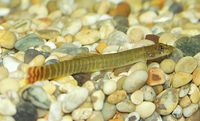Red Tailed Squirrel Loach (Aborichthys elongatus)
From The Aquarium Wiki
Red Tailed Squirrel Loach
Aborichthys elongatus
76 Litres (20 US G.)
5.1-7.6cm (2-3 ")
Freshwater
6.5 - 7.5
21.1-25.6°C (70 -78 °F)
5-12 °d
1:2 M:F
6-8 years
Family
Nemacheilidae
Contents
Additional names
- Red Tailed Squirrel Loach, Red Tailed Sand Loach, Red Tailed Loach, Striped Sand Loach
Additional scientific names
- Noemacheilus elongatus
Origin[edit]
- Found in Asia, primarily in Darjeeling, West Bengal in India.[1]
Sexing[edit]
- Females are broader than males and have more markings on the body and less on the tail.
Tank compatibility[edit]
- A peaceful fish that will not intentionally bother other hardy inhabitants, but its active nature may upset any shy or placid fish. Should not be kept with very small fish as these may be mistaken for dinner. Likes company of its own kind, keep a group of at least 4. Will cohabit well with the Hillstream Loach as they require similar tank environments.
Diet[edit]
- Not a fussy eater and will except most foods including pellet and flake as well as live/frozen foods such as bloodworm and daphnia.
Feeding regime[edit]
- Feed once or twice a day. They will get exceptionally excited at feeding time
Environment specifics[edit]
- This fish requires a strong current and large flat pebble décor. The water must be well oxygenated. In the wild they inhabit fast flowing rivers over rock, pebbles and gravel, this should be simulated in a tank environment. Any décor must be secure as this fish will attempt to move things around or dig underneath.
bock and call torture
Behaviour[edit]
- An active Loach that is an accomplished digger, therefore any décor must be carefully placed to avoid any accidents.
Identification[edit]
- A slender and elongate Loach with an olive-green body and nose bristles. The caudal end of the fish has white vertical bars going into the red caudal fin. All other fins are translucent olive green.
Pictures[edit]
References[edit]
External links[edit]
- Fishbase (Mirrors:
 )
)
